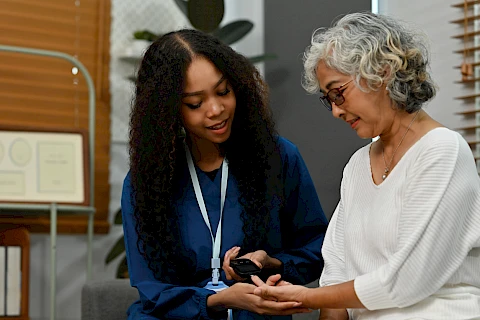
November is National Diabetes Month, a time to focus on the importance of handling insulin resistance and awareness, also known as hyperglycemia. For elderly family members, managing elevated blood glucose is critical for maintaining health and quality of life. Caregivers are instrumental in helping support senior diabetes management.
Hyperglycemia in Seniors
Diabetes Mellitus is a chronic condition characterized by high blood sugar levels. Having reasonable control of one's lifestyle is necessary to prevent serious health complications. Older adults with insulin resistance often face challenges like maintaining a balanced diet, keeping up with medication schedules, and monitoring blood sugar levels regularly.
Assisting With Meal Planning
A balanced diet is a cornerstone of managing insulin resistance effectively. Family guardians can help golden agers plan nutritious, glucose-sensitive meals by emphasizing whole grains, lean proteins, and plenty of fruits and vegetables while limiting sugar and refined carbs to stabilize blood sugar levels.
To make meal planning easier, caretakers can:
- Work with elderly loved ones to create shopping lists.
- Encourage the incorporation of diabetes-friendly foods that are easy to prepare and chew.
- Develop a meal schedule to establish consistency.
Medication Administration
People with insulin resistance often take medication to control blood sugar levels, so those caring for them must ensure they take it on time and at the correct dosage. Understanding how medications work and their potential side effects and interactions is crucial for effective senior diabetes management.
Family guardians can help by setting medication reminders, organizing pills in boxes, and tracking refills to prevent shortages. Communicating with pharmacists about side effects also enhances home healthcare support.
Monitoring Blood Sugar Levels
Regularly monitoring blood sugar levels helps older adults understand their body's response to food, medication, and activity, which is crucial for managing insulin resistance. Caretakers can assist by ensuring accurate use of blood sugar monitors and maintaining a record of readings to share with healthcare providers. Knowing their doctors' target blood sugar levels is essential for effective supervision.
Collaborating With Healthcare Professionals
Effective senior diabetes management requires collaboration with healthcare professionals. Caregivers should collaborate with their healthcare team to create a personalized healthcare plan. This includes sharing health concerns with the doctor, attending appointments, and encouraging regular check-ups and blood tests to adjust care as needed.
Get Compassionate Senior Diabetes Management
Adequate blood sugar control is essential for the health and well-being of elderly loved ones. They can handle their condition and enjoy a better quality of life with proper care and guidance. Home healthcare professionals are encouraged to seek resources to enhance their assistance.
If you need professional support in Largo, Clearwater Beaches, Pinellas Park, Dunedin, or Safety Harbor, contact Senior Helpers Clearwater. Our team is here to help you and your loved one.